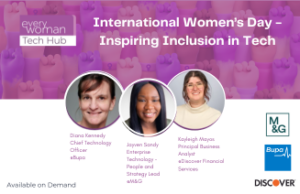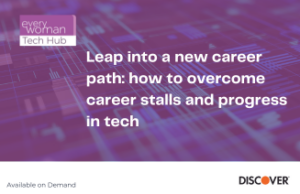
Universities aren’t just places to give you the knowledge and skills to take you elsewhere—when it comes to technology, they can also be great places to launch and grow a career in themselves.
In a recent everywoman in Tech Hub webinar, Imperial College London’s Jenny Rae, CIO and Brendan Whitefield, Head of Product Line, discussed the unique benefits and opportunities of academic institutions, often at the cutting edge of the tech revolution, for those looking to fast track a rewarding path in the ever-evolving digital space.
Education is a sector where huge amounts of transformation is happening…
Brendan: There are 235 million students worldwide, a number that’s doubled in the last 20 years and continues to expand.[1] With 10 UK universities in the world’s top 100, the UK is a very strong player in this sector. Technology is undergoing a huge transformation in education, particularly around developing and delivering online and blended learning. COVID-19 accelerated a transformation that was already taking place, and it’s now a necessity to get the digital and blended experience nailed in real time. On the flip side, this means that universities are good places for technology careers as innovation is at the core of their continued success. As such, we’re getting investment and buy-in now from technology departments that weren’t there in previous decades.
Purpose is a powerful driver in research institutions…
Jenny: I worked previously in the private sector and the biggest thing I’ve noticed at Imperial is how embedded purpose is across the whole organisation. It’s really inspiring to work in that kind of environment and I’m also proud of our high placement in the QS world university rankings; we are also in the top three universities in the UK and top in London. The pioneering work that’s happening at Imperial is amazing, particularly because we are a STEM University and we’ve won a lot of accolades around this. A lot of the COVID research work during the pandemic was driven from Imperial, for example, but we also have initiatives such as Imperial X where we’re using AI and data science to tackle some of the biggest global challenges, all the way through to more commercial views, such as helping to develop self-driving vehicles.[2] Working in this environment you can’t help but be inspired. The Information and Communications Technologies (ICT) department of Imperial want to be the best at supporting academics and students in this world-leading research.
Your work is aligned with cutting-edge innovation…
Brendan: One of the best things for me about working at Imperial is having your work align directly to what you can see on the ground in terms of world-class research and education. If getting value from your work and going home and thinking, ‘I’ve really made a difference’ is important to you, then a university is a great place to have a career. One of our core values at Imperial is centred around innovation, which is obviously great for a technology team because it allows us to play into that, do some of the more exciting things around technology, and see the benefit to the end users.
It’s a collaborative, iterative environment…
Jenny: Historically, the IT team and the rest of an organisation would be separate, particularly in more traditional structures. You would get a list of requirements from the business, and the IT teams would ping back what they think may or may not work. However, working that way means you don’t have a collaborative environment. At Imperial, our ICT team and the rest of the universityaren’t separate, and we have moved from a project-centric approach to a product-based approach that brings everyone together behind one vision. We all know where we’re going and what we’re working towards so we can achieve it jointly, with roadmaps across all the product lines to give us that alignment and stepping-stones to outcomes. We have also rolled out Agile training to help embed a mindset around how we can work differently. One of the key things in a product-centred approach is that there’s not necessarily a start and an end; products can continue to iterate as business requirements evolve.
You can see the value you bring in real time…
Brendan: Sometimes, when we’re doing a bigger piece of work, we need multiple sprints, but in general, we work on a two-week cycle with a product focus, so we deliver things on a regular basis. In the project world, I worked on multiple projects, and you wouldn’t get any pay-out or benefit out of some of them for up to two years. The iterative approach changes the game and means you can deliver value every couple of months and see the baby steps and enhancements as you move forward. These add up over a year, and down the line, you can clearly see that you’ve come a long way, which is very motivating not only for the team but for the business areas we’re working with, too.
Demand is high for a broad set of skills…
Brendan: There is not just one ‘fit’ in our teams; we are looking for a broad set of skills to make up our overall team. Depending on your background and what you want to do, there are multiple different roles that cover multiple different purposes, from high-skilled, technically focused development roles to non-technical roles, where the key is in understanding the technology and the capabilities and working with stakeholders to make sure we’re prioritising the right things and in the right order.
Jenny: I started in business, where I developed a passion for technology, and I think a tech career is very much about tapping into transferable skills. One of the most important things, though, is that you do need to have a level of passion for technology. It’s key to immerse yourself in some of the core technologies so that you have a level of understanding about things like Cloud Data or AI – don’t just badge yourself ‘non-technical’. Then, if you want to stay more on the business side, you could go down a service design or user experience route or a delivery manager role akin to a scrum master, helping to keep everyone ticking along, making sure we’re doing what we said we would do and delivering value.
Work-life balance is a priority…
Brendan: While the work is challenging and interesting, another benefit to a tech career in higher education is that there is a good work-life balance, too. I have two young children, and Imperial is a great place to be able to find the balance I need between hectic work and hectic family life—and that’s been the same at all the universities I’ve worked at. There’s a real understanding that people have a life outside of work while, at the same time, achieving some really great things and building a career.



